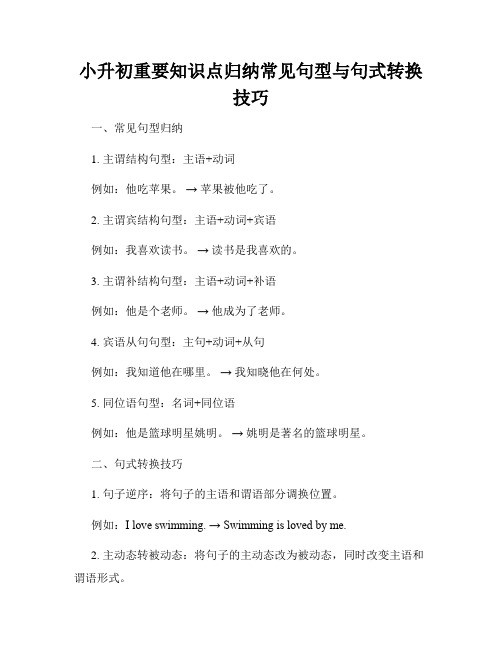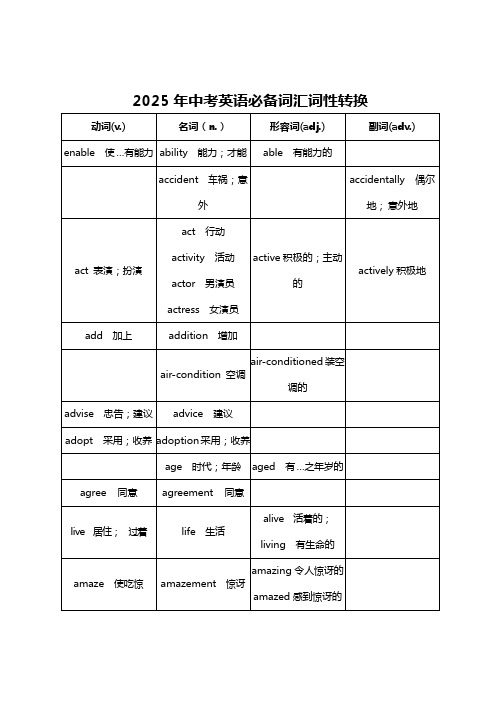小升初英语词性转换之葵花宝典
英语词性转换规则大全

英语词性转换法则大全之五兆芳芳创作(1)v.-n.动词转化为名词,post-postage mail-mailweigh-weight advise-adviceact-actor / actress-activechange-change-changeable(3) v.-a.-ad.-n.动词转化成形容词,副词,名词fill-fullneed-necessary-necessarilyinterest(v. / n.) interested /interestingperson personal ( 团体的; 私人的 )fun funnygentleman gentlemen human humanspossible possibly probable probably(7)a. ad. n.形容词转化为副词,名词true truly truthlucky luckily luck(8)原级比较级最初级far farther / further farthest / furthestlittle less least一、名词变成形容词的办法1. 在名词前面加-y可以酿成形容词(尤其是一些与天气有关的名词).例如:rain—rainy, cloud—cloudy, wind—windy, snow—snowy, health—healthy, luck—lucky等.注意:1)如果名词以重读闭音节结尾,且词尾只有一个子音字母,这时应双写词尾的子音字母再加-y.如:sun—sunny, fun—funny等.2)少数以不发音的e结尾的名词变成形容词时,应去掉e再加-y.例如:noise—noisy, ice—icy 等.2. 一些抽象名词在词尾加-ful可以变成形容词.例如:care—careful, thank—thankful, help—helpful, use—useful, beauty—beautiful等.3. 一些暗示国度的名词可以在词尾加-ese, -ish或-n组成暗示国籍、语言的形容词.例如:China—Chinese, Japan—Japanese, England—English, America—American, India—Indian, Australia —Australian(注意Canada—Canadian).4.在名词后加-ous变成形容词.例如:danger—dangerous等.5. 在名词后加-ly变成形容词.例如:friend—friendly, love—lovely等.6.在名词后加-less组成含有否认意义的形容词.例如:care—careless(粗心的),use—useless(无用的),hope—hopeless(没希望的),home—homeless(无家可归的)等.7. 一些以-ence结尾的名词,把ence改成ent酿成形容词.例如:difference—different, silence—silent等.二、动词变成名词的办法1.词形不变,词性改动.例如:work, study, water, plant等可以用作动词,也可以用作名词.2. 一些动词在词尾加上-er或-or之后就酿成了暗示“某一类人”的名词.例如:work—worker, teach—teacher, sing—singer, jump—jumper, play—player, learn—learner, visit—visitor, invent—inventor等.注意:1)以不发音的e结尾的动词,在词尾加-r.例如:drive—driver, write—writer等.2)以重读闭音节结尾,且末尾只有一个子音字母的动词,应双写末尾的子音字母,再加-er.例如:run—runner, win—winner, begin—beginner等.3. 在动词词尾加-ing酿成名词(办法与动词变成现在分词的办法相同).例如: meet—meeting, build—building, wait—waiting, wash—washing, swim—swimming, shop—shopping, begin—beginning等.三、形容词变成副词的办法一般在形容词的词尾加-ly可以酿成副词.例如:quick—quickly, slow—slowly, loud—loudly, sudden—suddenly 等.但是,以下几点值得注意:1. 一些以“子音字母+y”结尾的形容词,要把y改成i再加-ly.例如:happy—happily, angry—angrily, lucky—luckily, heavy—heavily, noisy—noisily 等.2. 有些以-ble或-le结尾的形容词,去掉e加-y.例如:possible—possibly, terrible—terribly等.3. 少数以e结尾的形容词,要去掉e再加-ly.例如:true—truly等.但绝大多数以e结尾的形容词仍然直接加-ly.例如:polite—politely, wide—widely等.4. 以-l结尾的形容词变成副词时仍然要在词尾加-ly,而不是只加-y.除非是以-ll结尾的才在词尾只加-y.例如:usual—usually, careful—carefully, useful—usefully, full—fully等.。
小升初重要知识点归纳常见句型与句式转换技巧

小升初重要知识点归纳常见句型与句式转换技巧一、常见句型归纳1. 主谓结构句型:主语+动词例如:他吃苹果。
→ 苹果被他吃了。
2. 主谓宾结构句型:主语+动词+宾语例如:我喜欢读书。
→ 读书是我喜欢的。
3. 主谓补结构句型:主语+动词+补语例如:他是个老师。
→ 他成为了老师。
4. 宾语从句句型:主句+动词+从句例如:我知道他在哪里。
→ 我知晓他在何处。
5. 同位语句型:名词+同位语例如:他是篮球明星姚明。
→ 姚明是著名的篮球明星。
二、句式转换技巧1. 句子逆序:将句子的主语和谓语部分调换位置。
例如:I love swimming. → Swimming is loved by me.2. 主动态转被动态:将句子的主动态改为被动态,同时改变主语和谓语形式。
例如:He plays football. → Football is played by him.3. 被动态转主动态:将句子的被动态改为主动态,同时改变主语和谓语形式。
例如:The book was written by her. → She wrote the book.4. 直接引语转间接引语:将直接引语改为间接引语,并相应修改动词和人称。
例如:"I am happy," he said. → He said that he was happy.5. 定语从句转定语从句:将定语从句转换为非限制性定语从句。
例如:The boy who is wearing a blue jacket is my brother. → The boy, wearing a blue jacket, is my brother.6. 条件句转换:将条件句从虚拟语气转换为陈述语气,或者反过来。
例如:I f it rains tomorrow, we won't go to the park. → We won't go to the park if it rains tomorrow.以上是小升初重要知识点中常见句型的归纳以及句式转换的技巧。
2025年中考英语必备词汇词性转换

boredom厌烦
bored 厌烦的;无聊的boring令人厌烦的
breathe 呼吸
breath 呼吸
bright明亮的
brightly明亮地
build 建造
building 大楼
business 商业;生意
businessman 商人
businesswoman 女商人
busy繁忙的
dangerous危险的
die死亡
death死亡
dead 死的;无生命的dying垂死的
decide 决定
decision 决定
decorate装饰
decoration装饰品
depart出发
departure 启程;离开
depend依靠;依赖
dependence依靠
detect 侦查;调查
detection侦查
2025年中考英语
动词(v.)
名词(n.)
形容词(adj.)
副词(adv.)
enable使…有能力
ability 能力;才能
able有能力的
accident车祸;意外
accidentally偶尔地;意外地
act 表演;扮演
act行动
activity活动
actor 男演员
actress 女演员
active积极的;主动的
meet遇见
meeting会议
memorize记住
memory记忆
mix 混合
mixture混合物
music音乐
musician音乐家
nation民族
nationality国籍
national民族的;国家的native本土的;本国的
初中英语常用词性转换200个.

初中英语常用词型转换1. work—worker2. invent—inventor(人--invention(物3. use—u4. permit-permission5. conduct—conductor-conduction6. care—c7. play—player8. visit—visitor9. careless10. conclude-conclusion11. inspect-inspector12. wake--awake/sleep 13. speak--speaker14. piano—pianist15.peace-16. cook—cook(人—cooker(物17. science—scientist-scientific18. miss—19. dance—dancer20. art—artist21. fish--f22. drive-driver-driven23. tour-tourist-tourism24. kind-k25.act-actor-actress-action-active-activity26. joural-jouralist27. nature--natural 28. manage-manager-management29. library-librarian30. cover-discover 31. foreign-foreigner32. music--musician-musical33. perform-performan 34. suggest-suggestion35. busy-business--businessman36. follow--following 37. invite-invitation38. post-postman/postwoman39. enter-40. write-writer-written41. sit--seat42. danger--dangerous 43. run-runner/win-winner44. wood-wooden45. serve-46.solve-solution47. lose--lost48. pride-49. sing-singer50. worry--worried51. collect-collection 52. swim-swimmer-swimming53. break--broken54. produ55. attract-attraction-attractive56. fill-filled--full57. contri58. travel-traveller-traveling59. reward--rewarding60. comfo61. compete-competition-competitor62. turn--turning63. instruc64. advise-advice65. fly--flight66. pollute--pollution-p 67. strange-stranger68. please-pleased-pleasant-pleasure69. move-70. wait-waiter-waitress71. know-knowledge-known72. appear--appearance 73. jump-jumper74. meet--meeting75. develo78. speak-speaker-spoken79. anger-angry/hunger-hungry80. frighten--frightened 81. print-printer(物82. noise—noisy--noisily83. suit-su84. sell—seller85. cross—across--crossing86. frustrate--frustrated 87. organize-organization-organized 88. ill—illness89. fire—90. own—owner91. pain--painful92. traditi93. explore-explorer94. thank--thankful-thankfully95. decorate-decorator 96. surf-surfer-surfing97. help--helpful-helpless-helper98. confid99. fog-foggy/sun-sunny100. wonder-wonderful--wonderfully101. differ102. balance-balanced103. colour-colourful104. impo105. paint-painter106. beauty-beautiful-beautifully107. good--goodness 108. rob-robber-robbery109. forget--forgetful110. person-personal 111. medicine -medical112. think-thought113. decide-decision 114. breathe-breath115. review-revision116. describe-descripti 117. possible-impossible-possibly118. late--later-latest-lately119. discuss-discussion 120. celebrate-celebration121. dry-drought122. enjoy123. beg-begging-beggar124. lone--lonely125. fun-f126. live-lively--alive127. shine-shiny128. educ129. love-lovely130. clear-clearly131. slow132. exact-exactly133. final-finally134. quick135. happy-happily-unhappy-happiness136. heavy-heavily137. near-138. real-really-reality139. sad-sadly-sadnes140. quiet141. silent-silently-silence142. polite-politely-politeness143. safe-safely-safety 144. luck-lucky-luckily-unlucky145. usual-usually-unusual146. healt147. success-successful-successfully-succeed148. excite-excited-exciting149. interest-interested 150. surprise—surprised—surprising151. amaze—amazed—amazing152. mean--meaning 153. bore—boring-bored154. grate—grateful(近thankful155. dark—156. fortunate-unfortunately157. treat—treatment158. build159. behave-behaviour160. salt-salty161. deep162. house-housework-housing163. health-healthy/wealth-wealthy164. begin165. marry-married-marriage166. lie-lying-lay168. frien169. complete-completely170. die-dead-death-dying171. especial-especially 172. fail-failure173. probable-probably174. realize-realization 175. Asia-Asian/America-American176. shy-shyly-shyness177. space-spaceship 178. high-highly-height179. one-first-once180. two-second-twice 181. bear-born-birth182. relax-relaxed-relaxing183. true-truly-truth 184. terrible-terribly185. call-called186. brigh187. sudden-suddenly188. direct-directly-direction189. wide190 correct-correctly191. press-pressure192. base-baseball-base 193. north-northern/east-eastern194. harm-harmful-harmless195. able-enable-ability 196.origin-original 197. long-length198. gentle-gently/simp 199. joy-joyful200. safety -safe-safelyse—useful-usedare—careful--carefullyareless—carelessly—carelessnesswake--awake/sleep—asleepeace-peacefulmiss—missingfish--fishingkind-kindnessnature--natural30. cover-discover33. perform-performance36. follow--followingenter-entrancedanger--dangerousserve--servicepride--proudcollect-collection54. produce--productioncontribute--contributioncomfort--comfortablenstruct--instruction66. pollute--pollution-pollutedmove--moving-movedappear--appearance-disappeardevelop-development-developing-developed frighten--frightened-frightening suit-suitablefrustrate--frustrated-frustratingfire—fireplaceradition--traditional95. decorate-decorator--decorationconfident--confidencedifferent--differenceimportanrt--importancegood--goodness110. person-personal113. decide-decision116. describe-description119. discuss-discussion122. enjoy-enjoyablefun-funnyeducate-education-educationalslow-slowly134. quick-quicklynear-nearlyquiet-quietlysafe-safely-safetyhealth-healthy-healthilyinterest-interested-interesting 152. mean--meaning155. dark—darknessbuild-builder-buildingdeep-deeplybegin-beginning-beginner 168. friend-friendly-friendship 171. especial-especially174. realize-realization177. space-spaceship180. two-second-twice183. true-truly-truth186. bright-brightlywide-widelybase-baseball-based195. able-enable-ability198. gentle-gently/simple-simply。
词性转换、一词多译(英汉)

词性转换:在英译汉过程中,有些句子可以逐词对译,而有些句子由于英、汉两种语言地表达方式不同,就不能用“一个萝卜一个坑”的方法来逐词对译。
原文中有些词在译文中需要转换词类,才能使汉语译文通顺自然。
(一)译例解析第一类:转译为动词英语和汉英比较起来,汉语中动词用的比较多,例如,在He admires the President’s stated decision to fight for the job (他对总统声明为保住其职位而决心奋斗表示佩服)句中,英语的谓语动词只有admires一个词,其它用的是过去分词(stated),动词派生的名词(decision)、不定式(to fight)和介词(for)。
汉语没有词性变化,但可以几个动词连用,因此英语中不少词类,尤其是名词、介词、形容词、副词,在汉译时往往可以考虑转译为动词。
例如:1. He came to my home for help.他来到我家,寻求帮助。
2. My admiration for him is growing more.我越来越敬佩他。
3.Unfortunately, he was also a bit bossy, a nd he wasn’t a very good listener.遗憾的是,他这个人有一点专横,不太善于听取别人的意见。
4.The operation of a machine needs some knowledge of it properties.操作机器就需要懂得机器的某些性能。
5. Rockets have found application for the exploration of the universe.火箭已经用来探索宇宙。
6.He is no smoker, but his father is a chain-smoker.他不抽烟,但他爸爸却一只接一只不停地抽。
7.His mom is a good cook.他妈妈做饭很好吃。
英语词性转换规则大全

英语词性转换规则大全(1).动词转化为名词,post-postage mail-mailweigh-weight advise-advice(2)动词转化成名词-形容词act-actor / actress-activechange-change-changeable(3) 动词转化成形容词,副词,名词fill-fullneed-necessary-necessarilyinterest(v. / n.) interested /interesting(4)n. a. n. a.名词转化为形容词person personal ( 个人的; 私人的 )fun funny(5)n. pl. n. pl.名词转化为名词复数gentleman gentlemen human humans(6)a. ad. a. ad.形容词转化为副词possible possibly probable probably(7)a. ad. n.形容词转化为副词,名词true truly truthlucky luckily luck(8)原级比较级最高级far farther / further farthest / furthestlittle less least一、名词变为形容词的方法1. 在名词后面加-y可以变成形容词(尤其是一些与天气有关的名词)。
例如:rain—rainy, cloud—cloudy, wind—windy, snow—snowy, health—healthy, luck—lucky等。
注意:1)如果名词以重读闭音节结尾,且词尾只有一个辅音字母,这时应双写词尾的辅音字母再加-y。
如:sun—sunny, fun—funny等。
2)少数以不发音的e结尾的名词变为形容词时,应去掉e再加-y。
例如:noise—noisy, ice—icy 等。
2. 一些抽象名词在词尾加-ful可以变为形容词。
例如:care—careful, thank—thankful, help—helpful, use—useful, beauty—beautiful等。
小升初英语须牢记的10类词性分类及用法
小升初英语须牢记的10类词性分类及用法小升初英语须牢记的10类词性分类及用法英语是非常重视平时积累的一门课程,每天不间断的学习记忆,英语成绩才会有所提高。
本文是店铺搜索整理的关于小升初英语须牢记的10类词性分类及用法,供参考阅读,希望对大家有所帮助!小升初英语须牢记的10类词性分类及用法 11、some用于肯定句中,在否定句和问句中改为any,但当表示委婉语气时仍用。
如:Can I have some writing paper? Would you like some orange juice?2 、代词人称代词主格做主语用一般放在句首或动词前。
主格分别是I ,you, he, she, it ,we ,you ,they。
宾格做宾语用,一般放在动词或介词后。
宾格分别是me ,you, him, her ,it, us ,you ,them。
如:Open them for me.Let us …, join me等。
形容词性物主代词放在名词前,不能单独使用。
分别是my ,your, his ,her, its, our, your, their。
名词性物主代词相当于形物加名词,它只能单独使用后面不好加名词。
分别是mine ,yours ,his, hers ,its, ours, yours ,theirs。
3 、介词介词后要么不加动词,加动词只能加动词ing形式。
如:be good at running;do well in jumping.(马上点标题下“小升初”关注可获取更多教育经验、方法、学习资料,每天更新哟!)4 、时间介词季节前,月份前用介词in。
如:in summer;in March具体的哪一天如星期几,几月几日用介词on。
如:on Saturday; on the second of April; on Wednesday morning在几点钟前用介词at。
如:at a quarter to four;只在上下午晚上用in如:in the morning/ afternoon/ evening;但在夜间用at night。
小升初分班考词性转换
Part 1 词性转换一1. She thought the young man was a queue _______ (jump).2. The three _______(visit) came to my house last Sunday.3. My uncle is a very good _______ (surf).4. Elaine went outside to _______ the playing field. After his _______, he went home.(inspector)5. Tea contains caffeine. It's bad for your _______.(unhealthy)答案解析1. jumper。
固定搭配jump a queue解释为插队。
反过来,插队的人要在动词jump后加上er表示人。
2. visitors。
Visit是动词,根据句意,填空处需要名词,表示人,所以加or。
3. surfer。
道理同上,填空处需要表示人的名词,加er。
4. inspect,inspection。
考法反过来,给的词是人。
第一个空需要的是动词,第二个空需要的是名词,所以去掉or是动词,动词是t结尾,变成tion就是名词。
虽然不是所有t结尾的动词都可以变成tion结尾的名词,但是这个概率很大,所以在不会做题时可以这么做。
5. health。
给的是一个反义形容词,填空处需要名词,所以需要否定前缀以及形容词后缀。
总结:重点是表示人的名词和其动词之间的转换,注意积累哦!!!!二1. Thousands of _______were lost in the earthquake happened in Japan.(life)2. John told us that he had made friends with a few ________ on the Facebook.(Germany)3. March 8 is _________Day.(woman)4. The room is so dirty that a lot of _______ can be seen running here and there. (mouse)5. My mother bought some _______yesterday. (tomato)答案解析:1. lives。
初中英语词性转换:3大词性转换汇总,考试必备!
初中英语词性转换:3大词性转换汇总,考试必备!01名词➡形容词A名词+y1.rain - rainy2.cloud - cloudy3.wind - windy4.snow - snowy5.health - healthy6.luck - lucky7.anger - angry8.guilt - guilty9.tourist - touristy10.salt - salty11.silk - silky12.sleep - sleepy注意:1)如果以重读闭音节结尾,且词尾只有一个辅音字母,这时应双写辅音字母再加 -y。
如:sun - sunny, fun - funny, fog - foggy, fur - furry2)少数以不发音的e结尾的名词变为形容词时,应去掉e再加-y。
如:noise - noisy, ice - icy, shine - shiny, taste - tastyB名词+ed1.spot - spotted2.talent - talentedanize - organized4.balance - balancedC名词+ful1.care - careful2.thank - thankful3.help - helpfule - useful5.meaning - meaningful D名词+less1.care - carelesse - useless3.hope - hopeless4.home - homelessE-ce改为-t1.difference - different2.silence - silent3.confidence - confident F名词+ly1.friend - friendly2.love - lovely3.live - livelyG名词+ous1.danger - dangerousH名词+al1.music - musical2.medicine - medical I名词+able1.adjust - adjustable2.value - valuableJ名词+en1.wood - wooden2.wool - woolenK名词+ese, ish, n(国籍)1.China - Chinese2.Japan - Japanese3.England - English4.America - American5.India - Indian6.Australia - Australian7.Canada - Canadian 02动词➡名词A词形不变,词性改变1.work2.study3.water4.plantB动词+er, or1.work - worker2.teach - teacher3.sing - singer4.jump - jumper5.play - player6.learn - learner7.visit - visitor8.invent - inventor9.collect - collector注意:1)以不发音的e结尾的动词,在词尾加-r.例如:drive - driver, write - writer等。
英语单词词性转换的基本规律
英语单词词性转换的基本规律一词性变换的一般的规律1.动词(v.)→名词(n.)(a)词形不变,词性改变work, study, water, plant等可以用作动词(工作,学习,浇水,种植),也可以用作名词(工作,学习,水,植物).(b)一些动词在词尾加上-er或-or之后就变成了表示"某一类人"的名词例如:work—worker, teach—teacher, sing—singer, jump—jumper, play—player, learn—learner, visit—visitor, invent—inventor,collect—collector等.注意:1)以不发音的e结尾的动词,在词尾加-r.例如:drive—driver, write—writer等.2)以重读闭音节结尾,且末尾只有一个辅音字母的动词,应双写末尾的辅音字母,再加-er例如:run—runner, win—winner,begin—beginner等.(c)在动词词尾加上-ment 变成名词例如:achieve—achievement (成就) advertise—advertisement(广告) agree—agreement disagree—disagreementamuse—amusement (娱乐) improve—improvement(争吵)commit(奉献)—commitment develop—development (发展)depart—department (局,部) govern(统治)—government(政府)manage—management (管理) equip—equipment (装备)有些单词比较特殊,需把动词后的e去掉再加ment.例如:argue—argument(争论)(d)在动词词尾加上-(t)ion/(s)ion变成名词例如: attract—attraction; instruct—instruction;invent—invention discuss—discussion;express—expression educate—education;graduate—graduation; operate—operation (去e再加"ion")compete—competition; organize—organization (把e改成其他字母再加"tion") decide—decision conclude—conclusion (把de改为s再加"ion")describe—description描写,描绘(这是特例,不规则变化)(e)在动词词尾加上-ance变成名词例如: appear—appearance (外貌;出现) perform—performance (演出)accept—acceptance (接受)(f)在动词词尾加-ing变成名词(方法与动词变为现在分词的方法相同)例如: meet—meeting build—building wait—waitingbathe—bathing say—saying(谚语) mean—meaningend —ending train —training wash—washing注意:以重读闭音节结尾,且末尾只有一个辅音字母的动词,应双写末尾的辅音字母,再加-ing如:swim—swimming shop—shopping begin—beginning(g)其他一些比较特殊的变化例如: Beg(乞讨)—beggar(乞丐) behave(行为举止)—behaviorknow(知道)—knowledge(知识) fly—flight (飞行)heat (加热)—heat(热量) hit (撞击)—hit( 轰动一时的人或物,碰撞)mix (混合)—mixture(混合物) press(按,压)—pressure(压力)sit(坐)—seat (座位) succeed—success(成功)tour—tour(旅游)/ tourist (游客)2.动词(v.)→形容词(adj.)(a)动词后面加able,以e结尾的动词则去e加able,表示具有此性质,特点或属性.例如: afford-affordable;love-lovable(b)动词后面加ed,以e结尾的动词则直接加d,表示被动性的属性或特点.例如: scatter-scattered use-used(c)不规则的动词则必须记忆,记住其过去分词形式.规律不大,意义同(b).3.名词(n.)→形容词(adj.)(a)在名词后面加-y可以变成形容词(尤其是一些与天气有关的名词)例如: rain—rainy, cloud—cloudy, wind—windy, snow—snowy,health—healthy, luck—lucky,anger—angry guilt—guilty(内疚的)tourist—touristy(游客多的) , salt (盐)—salty (咸的)silk(丝绸)—silky(丝绸般的), sleep—sleepy (昏昏欲睡的)注意:1)如果以重读闭音节结尾,且词尾只有一个辅音字母,这时应双写辅音字母再加"-y". 如: sun —sunny, fun—funny, fog—foggy(有雾的), fur—furry(毛皮的)2)少数以不发音的e结尾的名词变为形容词时,应去掉e再加"-y".如: noise—noisy, ice—icy, shine—shiny(发亮的), taste(口味)—tasty(甜的)(b)名词后面加-ed,以e结尾的直接加d.例如: spot(斑点)—spotted(有斑点的); talent—talented (有天赋的)organize—organized 有组织的; balance—balanced(平衡的)(c)一些抽象名词在词尾加-ful可以变为形容词例如:care—careful, thank—thankful, help—helpful,use—useful, meaning—meaningful(d)在名词后加-less构成含有否定意义的形容词例如:care—careless(粗心的), use—useless(无用的)hope—hopeless(没希望的),home—homeless(无家可归的)(e)一些以-ce结尾的名词,把-ce改为-t变成形容词例如: difference—different, silence—silent, confidence—confident(f).在名词后加-ly变为形容词例如: friend—friendly, love—lovely, live---lively(g).在名词后加-ous变为形容词例如: danger—dangerous(h)名词后面加-al变为形容词例如: music—musical; medicine—medical (这个比较特殊)(i)名词后面加-able变为形容词,如果以e结尾就去e再加"-able".例如: adjust—adjustable 可调整的value—valuable有价值的(j)名词后面加-en变成形容词例如: wood—wooden 木制的wool—woolen 羊毛的(k)一些表示国家的名词可以在词尾加-ese, -ish或-n构成表示国籍,语言的形容词例如:China—Chinese, Japan—Japanese, England—English,America—American, India—Indian, Australia —Australian (注意Canada—Canadian)4.形容词(adj.)→副词(adv.)▲一般在形容词的词尾加-ly可以变成副词例如: quick—quickly, slow—slowly, loud—loudly, sudden—suddenly 等但是,以下几点值得注意:(a) 一些以"辅音字母+y"结尾的形容词,要把y改为i再加-ly例如: happy—happily, angry—angrily, lucky—luckily, heavy—heavily, noisy—noisily(b) 有些以-ble或-le结尾的形容词,去掉e加-y例如:possible—possibly, terrible—terribly(c)少数以e结尾的形容词,要去掉e再加-ly例如: true—truly但绝大多数以e结尾的形容词仍然直接加-ly 例如: polite—politely, wide—widely(d)以-l结尾的形容词变为副词时要在词尾加-ly,以-ll结尾的才在词尾只加-y.例如: usual—usually, careful—carefully, useful—usefullyfull—fully (以-ll结尾的才只加y)二. 派生:指由一个词根加上前缀和(或)后缀构成另一个词的构词形式。
- 1、下载文档前请自行甄别文档内容的完整性,平台不提供额外的编辑、内容补充、找答案等附加服务。
- 2、"仅部分预览"的文档,不可在线预览部分如存在完整性等问题,可反馈申请退款(可完整预览的文档不适用该条件!)。
- 3、如文档侵犯您的权益,请联系客服反馈,我们会尽快为您处理(人工客服工作时间:9:00-18:30)。
英语词性转换
一、名词变形容词 (n.- adj.)
1. 在名词后面加-y可以变成形容词(尤其是一些与天气有关的名词)。
例如:rain—rainy, cloud—cloudy, wind—windy, snow—snowy等。
1)如果名词以重读闭音节结尾,且词尾只有一个辅音字母,这时应双写词尾的
辅音
字母再加-y。如:sun—sunny, fun—funny等。
2)少数以不发音的e结尾的名词变为形容词时,应去掉e再加-y。
例如:noise—noisy, ice—icy 等。
2. 一些抽象名词在词尾加-ful可以变为形容词。
例如:care—careful, thank—thankful, help—helpful, use—useful,
beauty—beautiful等。
3. 一些表示国家的名词可以在词尾加-ese, -ish或-n构成表示国籍、
语言的形容词。
例如:China—Chinese, England—English, America—American, India—
Indian
(其中注意Canada—Canadian)。
4.在名词后加-ous变为形容词。例如:danger—dangerous等。
5. 在名词后加-ly变为形容词。例如:friend—friendly, love—lovely等。
6.在名词后加-less构成含有否定意义的形容词。
例如:care—careless,use—useless,hope—hopeless,home—homeless等。
7. 一些以-ence结尾的名词,把ence改为ent变成形容词。
例如:difference—different, silence—silent等。
二、动词变名词(v.-n.)
1.词形不变,词性改变。
例如:work, study, water, plant等可以用作动词,也可以用作名词。
2. 一些动词在词尾加上-er或-or之后就变成了表示“某一类人”的名词。
例如:
work—worker, teach—teacher, sing—singer, jump—jumper, play—
player,
learn—learner, visit—visitor, invent—inventor等。
1)以不发音的e结尾的动词,在词尾加-r。
例如:drive—driver, write—writer等
2)以重读闭音节结尾,且末尾只有一个辅音字母的动词,应双写末尾的辅音字
母,
再加-er。
例如:run—runner, win—winner, begin—beginner等。
3. 在动词词尾加-ing变成名词(方法与动词变为现在分词的方法相同)。
例如: meet—meeting, build—building, wait—waiting, wash—
washing,swim—swimming等。
三、形容词变副词(adj.-adv.)
一般在形容词的词尾加-ly可以变成副词。
例如:quick—quickly, slow—slowly, loud—loudly, sudden—suddenly 等。
注意几点:
1. 一些以“辅音字母+y”结尾的形容词,要把y改为i再加-ly。
例如:happy—happily, angry—angrily, lucky—luckily, heavy—heavily,
noisy—noisily 等。
2. 有些以-ble或-le结尾的形容词,去掉e加-y。
例如:possible—possibly, terrible—terribly等。
3. 少数以e结尾的形容词,要去掉e再加-ly。
例如:true—truly等。
但绝大多数以e结尾的形容词仍然直接加-ly。
例如:polite—politely, wide—widely等。
4. 以-l结尾的形容词变为副词时仍然要在词尾加-ly,而不是只加-y。
除非是以-ll结尾的才在词尾只加-y。
例如:usual—usually, careful—carefully, useful—usefully, full—fully
等。
三、其他
以t(或te)结尾的动词,变名词时为tion(或去e变tion),变形容词时为tive(或
去e变tive)
以s(或se)结尾的动词,变名词时为sion(或去e变sion),变形容词时为sive(或
去e变sive)
